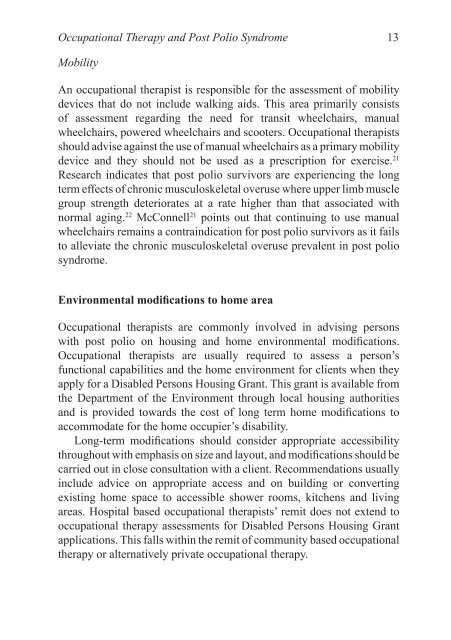Post Polio Syndrome - Management & Treatment in Primary
Post Polio Syndrome - Management & Treatment in Primary
Post Polio Syndrome - Management & Treatment in Primary
You also want an ePaper? Increase the reach of your titles
YUMPU automatically turns print PDFs into web optimized ePapers that Google loves.
Occupational Therapy and <strong>Post</strong> <strong>Polio</strong> <strong>Syndrome</strong> 13<br />
Mobility<br />
An occupational therapist is responsible for the assessment of mobility<br />
devices that do not <strong>in</strong>clude walk<strong>in</strong>g aids. This area primarily consists<br />
of assessment regard<strong>in</strong>g the need for transit wheelchairs, manual<br />
wheelchairs, powered wheelchairs and scooters. Occupational therapists<br />
should advise aga<strong>in</strong>st the use of manual wheelchairs as a primary mobility<br />
device and they should not be used as a prescription for exercise. 21<br />
Research <strong>in</strong>dicates that post polio survivors are experienc<strong>in</strong>g the long<br />
term effects of chronic musculoskeletal overuse where upper limb muscle<br />
group strength deteriorates at a rate higher than that associated with<br />
normal ag<strong>in</strong>g. 22 McConnell 21 po<strong>in</strong>ts out that cont<strong>in</strong>u<strong>in</strong>g to use manual<br />
wheelchairs rema<strong>in</strong>s a contra<strong>in</strong>dication for post polio survivors as it fails<br />
to alleviate the chronic musculoskeletal overuse prevalent <strong>in</strong> post polio<br />
syndrome.<br />
Environmental modifications to home area<br />
Occupational therapists are commonly <strong>in</strong>volved <strong>in</strong> advis<strong>in</strong>g persons<br />
with post polio on hous<strong>in</strong>g and home environmental modifications.<br />
Occupational therapists are usually required to assess a person’s<br />
functional capabilities and the home environment for clients when they<br />
apply for a Disabled Persons Hous<strong>in</strong>g Grant. This grant is available from<br />
the Department of the Environment through local hous<strong>in</strong>g authorities<br />
and is provided towards the cost of long term home modifications to<br />
accommodate for the home occupier’s disability.<br />
Long-term modifications should consider appropriate accessibility<br />
throughout with emphasis on size and layout, and modifications should be<br />
carried out <strong>in</strong> close consultation with a client. Recommendations usually<br />
<strong>in</strong>clude advice on appropriate access and on build<strong>in</strong>g or convert<strong>in</strong>g<br />
exist<strong>in</strong>g home space to accessible shower rooms, kitchens and liv<strong>in</strong>g<br />
areas. Hospital based occupational therapists’ remit does not extend to<br />
occupational therapy assessments for Disabled Persons Hous<strong>in</strong>g Grant<br />
applications. This falls with<strong>in</strong> the remit of community based occupational<br />
therapy or alternatively private occupational therapy.<br />
PPS Mngt and Treat.<strong>in</strong>db 13 02/07/2007 16:07:49





